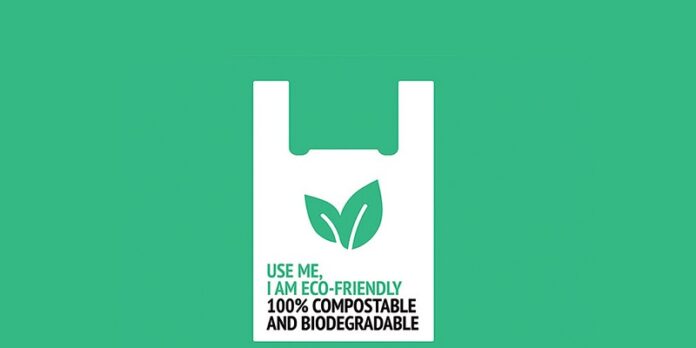Compostable bags come from the natural plant starch with wood lignin and don’t create any toxic materials. It means that these bags break down voluntarily in various composting systems via microbial activity to make compost. Depending on the needs of the households, compostable bags are utilized in kitchen tin for collecting food scraps.
One of the greatest facts about compostable bags is that they are vital waste diversion products not only for your home but also for business establishments or zero-waste events. These bags are BPI-certified compostable and have renewable resources. In fact, some supermarkets like the Co-operative and Waitrose keep on providing compostable bags. These serve as the alternative to the different types of plastic bags.
Theoretically, bags marked as “compostable” are composed of vegetable matter like corn or potato starch, which are easily break down. But, there is a certain condition to make them break down. In some cases, a home compost situation is not enough. It needs to process in the centralized composting facilities, a place where the compost is proven effective to reach its high temperatures.
If a certain bag is marked as “home compostable” and has been certified as compostable by the UK Composting Association, it should have included a seedling logo. Some retailers prefer to prefigure the utilization of compostable packaging. They believe that it is a prime solution to several landfill issues. However, cynics claimed that the majority of the composting packaging would be placed in the usual waste for dumping in a landfill. As a result, organic substances in a landfill will give off methane as it degrades. Also, if compostable packaging is placed into the recycling spot, it can taint all the materials in it. In short, the whole batch of composting packages is not subject to recycling.
The main concern about the utilization of compostable packaging is that it encourages recycling. It is highly observed by most people compared to reducing the amount of waste generated. In fact, it is always better to reuse and reduce than to recycle.
Waitrose has substituted its plastic vegetable and fruit bags with home compostable ones while it is taking away the 5p plastic container bags. Co-operative container bags, on the other hand, are considered home compostable.
Emma Priestland, a renowned plastics supporter at Friends of the Earth, claimed that it is nice to see huge companies like Waitrose searching for effective ways to lessen the plastic in their respective shops. However, bio-based or compostable bags are not necessarily the ultimate solution. This is a scheme of swapping one type of single-use plastic bag to another. It is the best solution if we actually remove the packaging.
Compostable coffee cups need several years to breakdown, while garden and food waste only takes a few weeks at the composting facility of In-Vessel.
The major thing you can place in your garden and food bin, apart from garden and food waste, are compostable food containers to line the galley food tin. These food bags must have the EN1342 seedling logo.
Why do you need to use compostable bags? Now, there are several reasons why you have to use these compostable bags, namely:
- 100% Ecologically Friendly – One of the major facts about compostable bags is their pure eco-friendly approach. These bags require less carbon to produce, lessens the amount of waste in the landfill, and decreases the level of air, soil, and water pollution. Above all, compostable bags can be of great help in conserving resources by declining the amount of virgin or new materials needed to create packaging.
- Appeals to People with Strong Concerned about Ecological Impact – According to researchers, more or less ¾ of the consumers prefer to purchase products with eco-friendly packaging. Therefore, compostable bags and packaging are still observed by many.
- Increases Return of Investment – Even if compostable packaging films or bags cost a little more compared to standard ones, using this one sees an increased ROI. This is because companies who use compostable bags and packaging films increase their company image. They also provide a viable advantage against others that are not using eco-friendly stuff.
These benefits encourage business tycoons to shift from plastics to compostable bags and packaging films.
Now, let’s check the most in-demand compostable bags in the market – the compostable ziplock bags. These bags are an eco-friendly and sustainable substitute for fresh produce packaging, apparel packaging, and even dry food packaging. Compostable ziplock bags are a sustainable scheme to secure delicate stuff in reusable bags. They can even produce fresh while keeping outstanding shelf-impact.
The compostable ziplock bags are made from lightweight, highly transparent, printable single-ply, and durable compostable film with an approved compostable zip-lock for easy-open and secure locks. These bags are available with a security seal and bottom gusset for high volumes. Here are some of the features of compostable ziplock bags you shouldn’t miss to know:
- Available easy-carry handle
- With ventilation holes
- Bottom gusset that makes packages to contain bigger volumes
- Digital printing and flexographic is available in different colors and styles
Depending on your choice, you can use these compostable ziplock bags to keep your grocery items like fresh produce, dry good, and many more. Others may also use these bags while preparing special dishes for the whole family, especially when they opt to bring packed or ready-to-eat meals. When it comes to compostable ziplock bags, there are various options to choose from. One of these is the Stasher ziplock bags. These are made of platinum silicone, 100% plastic-free, and proven microwave safe. These bags have toxin-free materials, and thus, you can use them to store and freeze food in them. Since these bags come in various colors, sizes, and shapes, you pick any style you want. Another type is the “Biobags.” These are also some of the famous eco-friendly compostable bags, having BPI-free materials. These bags can be utilized once or twice, and therefore not considered “reusable” bags. These compostable ziplock bags are perfect for packing sandwiches, nuts, or fruits to work and school. You can also utilize them to store dry food in the refrigerator, often not more than three to four days.








